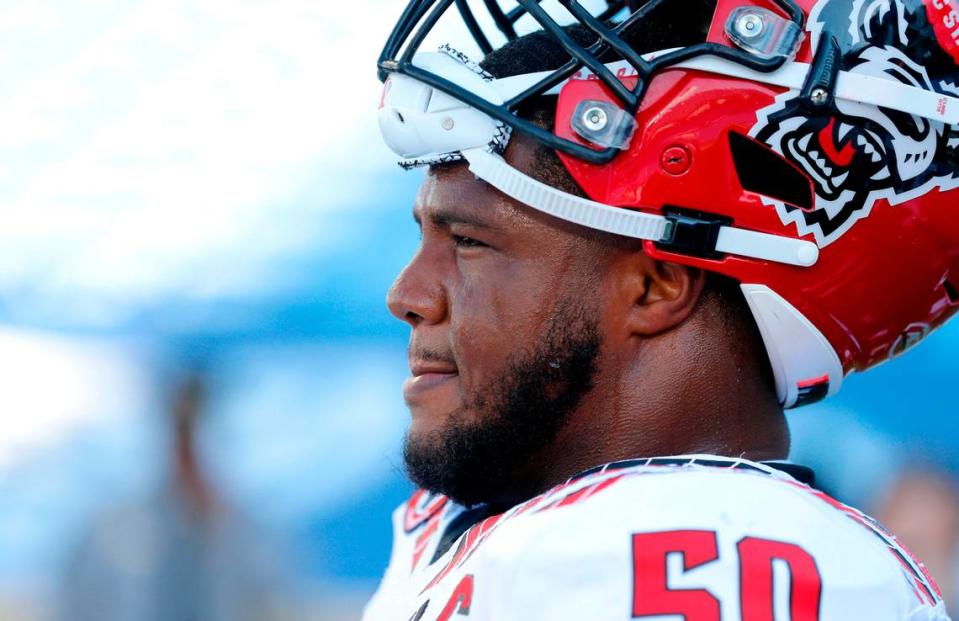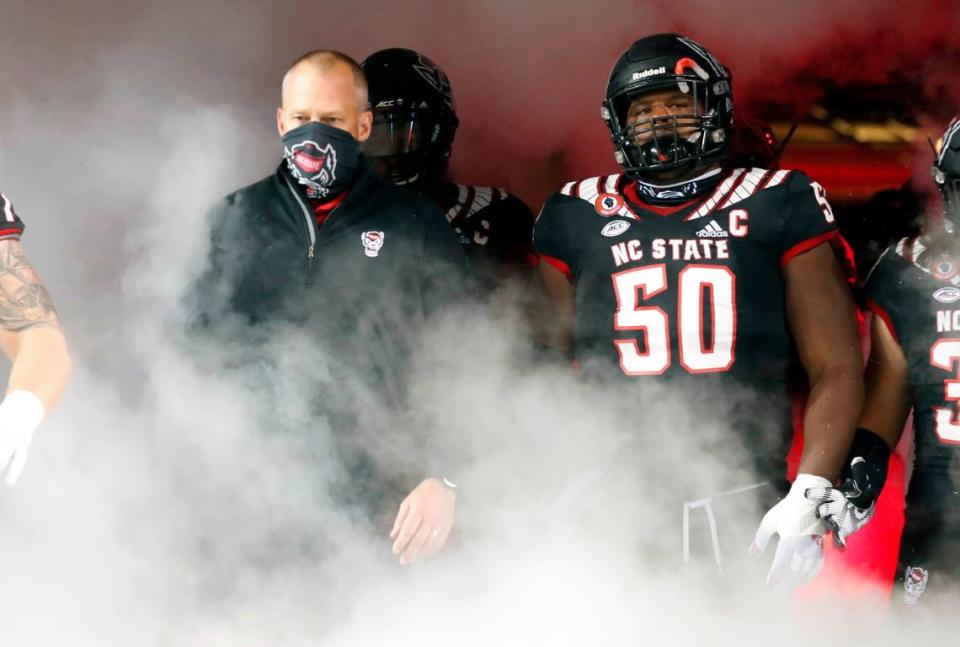His famous granddad broke racial barriers. This NC State athlete is learning to, too.
Long before N.C. State’s Grant Gibson was making a name for himself on the football field, his grandfather was breaking down racial barriers in North and South Carolina.
When he was young, Gibson didn’t think much about it when his grandfather Harvey Gantt drew attention when the family was out and about around Charlotte.
If they were at a restaurant, someone always came over to talk to them. Maybe it was to introduce themselves or to shake his grandfather’s hand. To Gibson, though, Gantt was just “Granddad,” the huge sports fan who would park in his chair on Saturday, watching a continuous loop of everything from golf to college football on television.
It wasn’t until Gibson was in third grade that he realized who his granddad really was and the history that he had made, not just locally but across the Carolinas.
In 1963, Gantt became the first African-American student admitted to Clemson University, where he met his wife, Lucinda, the second African-American student at the school. Twenty years later, Gantt became the first African-American mayor of Charlotte, serving two terms from 1983-1987.
Gantt’s name is also linked to legendary basketball player Michael Jordan. In 1990, when Gantt was running for U.S. Senate against Republican incumbent Sen. Jesse Helms, a race that drew national attention, Jordan declined to endorse Gantt. Jordan quipped, “Republicans buy sneakers, too.”
.
Gibson, a junior center and a captain on N.C. State’s football team, is the second oldest of Gantt’s nine grandchildren. Gibson’s mother, Sonja, is Gantt’s oldest child.
Gantt has a signed photo from former President Barack Obama, the country’s first Black president, with the message “an early inspiration.” On the corner of South Tryon and Stonewall streets in downtown Charlotte sits the 46,500-square-foot Harvey B. Gantt Center for African-American Arts & Culture, which was renamed for Gantt in 2007.
He’s one of the most influential figures in North Carolina politics.
“I think I was in third grade when I could actually, like, understand what he had done,” Gibson told The News & Observer. “And then I was like, ‘This is some big stuff.’ And so ever since then, I’ve just had the chance to learn from him. And just to hear his story, and his experiences and things like that has taught me a lot.”

Getting involved with social justice movements
Knowing what Gantt has accomplished, like making history at Clemson, and the things he has endured, have shaped Gibson into the man he is today.
Gibson, who normally is reserved, was vocal last summer with #PackUnited, an initiative at N.C. State “that focuses on denouncing racism and police brutality,” during protests of social injustice.
Outside of being vice president of his fifth-grade class, Gibson hadn’t dabbled in politics. But with police shootings becoming more common, and what Gibson and many others saw as unfair treatment of minorities happening every day, he was ready to make an impact.
When tensions surrounding social injustices started heating up last summer after the death of George Floyd, who was killed after Minneapolis police officer Derek Chauvin knelt on Floyd’s neck for 8 minutes and 46 seconds, Gibson sought out his grandfather.
Mitch Gibson, Grant’s father, said Gantt had a passive, yet effective way, to make sure his grandson became one of the young players to lead the charge in Raleigh.
“Harvey is not one of those guys when he tells Grant, ‘OK, you need to do this,’ but he sort of leads you down a path with his questioning,” Mitch Gibson told the N&O. “You could kind of see where he was saying, ‘OK, Grant, get involved, speak up,’ but he didn’t say that he needed to do that. He just kind of subtly led him down a path.”
From there, Grant Gibson began leading marches and being part of meetings with N.C. State’s Student-Athlete Advisory Council (SAAC) executive committee.
As the center on the football team, being vocal and directing come easy to him. Being in the middle of an intense social climate was totally different, but Gibson had a good source of inspiration.
“I’ve had talks with him since all this stuff has happened,” Gibson said of his grandfather. “And he’s basically just given sound advice on things to do. You know, just stand up for the things that you believe in, even if it is those out there that don’t agree with you. Just keep fighting because it’s going to do good.”

Staying humble when granddad is famous
Until last week, no one at N.C. State knew Gantt was Gibson’s grandfather. It wasn’t something he was trying to hide, yet it wasn’t information he felt the need to volunteer, either.
“I didn’t say anything you know, it’s not because I’m ashamed of it, but that’s just because you know, it’s humbleness,” Gibson said. “I wasn’t trying to flaunt anything.”
Plus, Gibson said, growing up in Charlotte, where Gantt is a larger-than-life figure, there always was extra attention on him, from grade school through Mallard Creek High. Gibson said people would expect more from him because of his grandfather.
Mitch explains that the family didn’t routinely discuss Gantt’s legacy, rather it was an unspoken clause that came with the bloodline. Part of that clause was to understand what Gantt accomplished, but find a way to make your own path. Mitch Gibson credits Lucinda Gantt, his mother-in-law, with setting that tone.
“We all need to do what we need to do to have our own level of accomplishments,” said Mitch, repeating her message to the family. “And I think that carried over to Grant. It’s just kind of like, nobody is going to give me anything in this world so I need to work hard for what I get.”
Gibson’s career at NC State
Grant Gibson has started to carve out a name for himself since arriving at N.C. State in 2017. Gibson, who was a four-star recruit at Mallard Creek in Charlotte, moved from defensive line to offensive line in 2018. He became a starter ahead of the 2019 season and has anchored the offensive line ever since.
At the end of the 2020 season, Gibson won two team awards: the Michael Hardy Award for winning attitude and the Bob Warren Award for Integrity and Sportsmanship.
According to Pro Football Focus (PFF), Gibson was the ninth-ranked center in the country last season, with an overall grade of 77.9. Late in the fourth quarter of the Gator Bowl in January, Gibson injured his knee and left the game. He didn’t require off-season surgery and is expected to be fully recovered by the start of the 2021 season.
Next season, expectations will be high for the N.C. State offense, and Gibson will be the focal point of the guys up front, leading the way for the explosive skill position players.
Pushing around 300-pound defenders comes with the territory. Leading the Pack with his voice is something Gibson has improved on each year. Doing it off the field was new to Gibson and caught everyone by surprise.
“I was so proud and so shocked at the same time,” Mitch Gibson said. “Grant is a very — at least he had been — a very behind-the-scenes kind of guy. He never really wanted a lot of attention. He just kind of always felt like, let my actions speak for me. This summer I was very surprised, very, very, very proud of how he was stepping out.”

Gantt creates opportunities for other Black people
Grant Gibson has played at Clemson only once.
It was October 2018, his redshirt freshman season, and N.C. State traveled to Death Valley. As Gibson lined up and looked across the line of scrimmage, he most likely saw faces like his — young, Black men, playing football at one of the premier college powerhouses in the country.
While on the sidelines, he could quickly glance at the Black Clemson students in attendance, there to support the Tigers. It wasn’t lost on him, even during the heat of the game, that his grandfather, one of his biggest fans and the man who made it possible for the current Black students, was in the stands that day.
“It’s huge,” Gibson said. “I’m blessed because I know certain things that he did so that I could get the opportunity to do the things that I want to do now. It’s great to have somebody like that close to you because you have a front-row seat to see and to hear everything that he’s been through.”
As Gibson has become older, he’s found himself pulling up a chair next to granddad whenever he’s back in Charlotte, picking his brain, asking questions about leading and being in the public eye. When he was younger, Gibson admits he took for granted just how important his grandfather was to Charlotte.
A quick Google search, especially during Black History Month, can answer all those questions for Gibson. But why go online when you can go directly to the source?
“If there’s ever anything I need to learn,” Gibson explained, “I’ll call my mom … or I’ll ask him.”

 Yahoo Finance
Yahoo Finance 